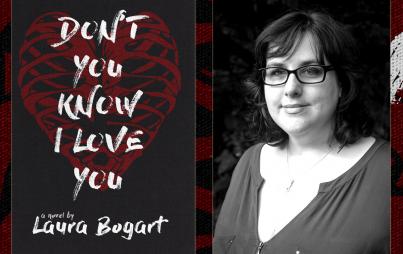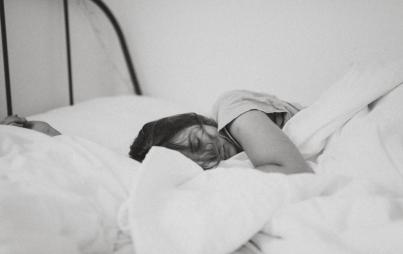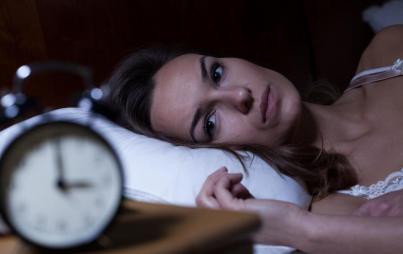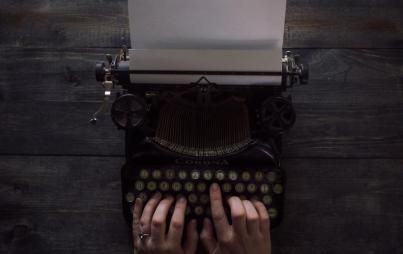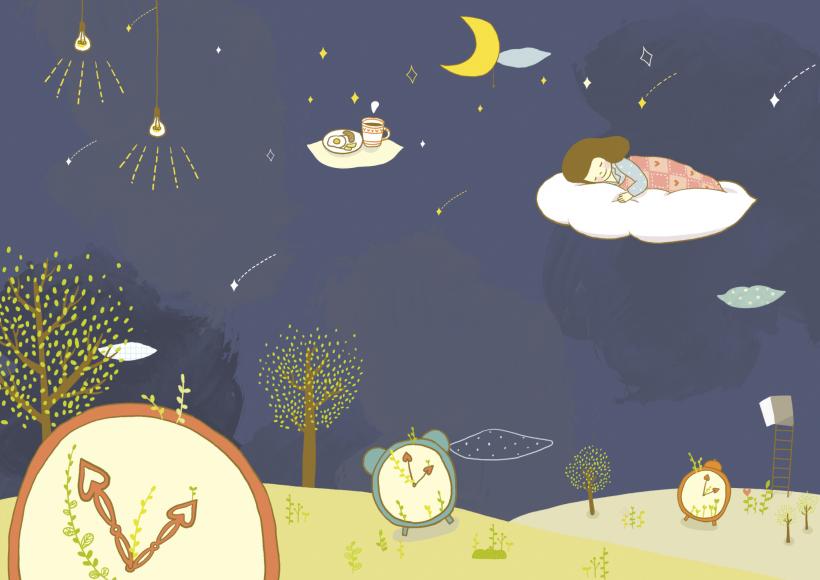
Eva, having stayed up the whole night preoccupied with death and time, planned to call in sick. It started out like any other insomniac’s night; she bathed, read a Victorian novel for fifteen minutes, snuffed out the lilac-scented candles, and meditated on calm oceans for thirty minutes before slipping under the covers and lying, wide awake, by eleven-fifteen. Calling all the telltale signs of another restless night, she slipped out of bed and began her other ritual: watching hours of late-night television, specifically infomercials. Somehow the combination of useless crap and over-zealous selling points really turned her on; in fact, she sometimes masturbated to the spiky-haired man selling ultra absorbent towels. But on this particular night, she fell for a middle-aged man named Todd who was trying his best to sell a blender.
Even with his portly figure and thinning light brown hair, there would have been nothing sad about him if it weren’t for his eyes. Somehow they looked more liquid than eyes; they looked deep and black and justifiably depressed. Eva wondered if his parents had the same eyes, if they knew he sold blenders into the early morning, if they were still alive. She wondered if his real name was Todd and if he dreamed of being an astronaut when he was young, when time still existed as an inexhaustible resource. She felt for him—maybe more than she’d felt for anyone in her life—and so, she ordered a blender.
When most people get up for work and begin their day, Eva looked in the refrigerator mechanically for food only to find a six-pack and a box of baking soda. Feeling it might be a good day after all, she reached for a beer. She was waiting for her blender (which she ordered for same-day delivery) because it had the potential to change her life. She couldn’t know how yet, but there was potential. The anticipation kept her day full of mystery and intrigue. In a way, it was keeping her alive. She sipped her beer, savoring the moment.
Later, when she would call in sick, her boss would believe her because he knew nothing (or most likely didn’t care) about her past as a depressive alcoholic. Somehow, her past didn’t make it all the way from Santa Barbara to San Diego, but hardly anything did against the traffic. Only a four-hour drive and decades away, Eva found a fresh start as a bartender at a local dive called Fishy’s. Eva scored the best shift working from the early afternoon into the evening when the most belligerent customers arrived for happy hour and stayed far past it. They were often the most overworked, financially stable, emotionally repressed crowd of bar-goers.
Behind the counter, she could listen to their problems and feel close to them in the comfort of a drink-induced fog. Before they paid their tab and went off into the day or night to their families, girlfriends, boyfriends, or empty apartments, she could slip into that golden hour that opened up everything for conversation. She had heard everything from marital disasters to best friend dilemmas and even the perils of raising goats in a suburban backyard. Eva talked to a man once who had just returned from a trip to Lake Havasu where his friend lost an arm to a speedboat propeller. He said it was cut clean off at the shoulder and mangled beyond recognition. She asked if it had been traumatizing.
“I don’t know,” he said, “I haven’t really slept since.”
Bartenders couldn’t give any details about their own personal lives to the customers—a Fishy’s policy implemented after a girl was stalked and murdered by an adoring patron once. Somewhere between the policy and the place, Eva had confidence she could escape her problems, even if she was surrounded by endless bottles of booze everyday. Her stints in rehab during junior and senior years of high school taught her that addiction was a choice and in the presence of temptation, failure could be avoided with a strong will and devotion to god. Eva also considered the bullshit peddled by her all-girls Catholic school to be detrimental to her spiritual growth. Oftentimes, she wavered between sympathizing for people and hating them with such intensity she feared she might be insane. Eventually she tossed it all to the wind and retreated to more stable pursuits like drinking and shopping.
Eva finished her third beer in the shower and felt the buzz start to wear off as she blew her long hair dry. Naked, with her hair still damp, she searched the kitchen cabinets for an old bottle of wine. It was red and made her think of the first time she had sex and how it wasn’t like anything Sappho had promised. The longing, the desire, the cracked voice and dizzying blindness—it didn’t come close. Eva could never remember feeling that way about anyone, and at twenty-five, had given up. Pouring herself a mug, she thought of her first boyfriend and how she never liked him that much the three years they’d dated.
At fourteen, he fell in love at first sight and Eva felt too sorry to say no to a night out bowling. Afterward, they had their first kiss in the parking lot and he asked her to be his girlfriend. Eva knew she would lose her virginity to him and had a vague feeling it could change her life—for better or worse. Maybe she could feel love for someone the way Romeo felt it for Juliet or Petrarch for Laura, like everyone used to when love’s value was at its highest and time stopped and language staggered. She reserved the distant hope that maybe she could love someone so much it’d leave every part of her throbbing.
She decided then, refilling her mug, that maybe she didn’t want any of that. The nymphs who lurked in dark forests and deep ponds, the capricious gods of desire and suffering, all now encapsulated by the latest pop song about just needing somebody to love made her resent love altogether—that and the fact that her first time lasted a total of two minutes. Two minutes amounting to nothing, she thought, in the scope of her long life’s journey toward death.
What would Eva’s mother say about her roundabout depressive thoughts? She loved the way her mother never took any nicknames. Eva was Eva even though she was Evalyn. Caroline, Car-o-line, you had to say the whole thing or else she wouldn’t hear you. She believed it was more distinguished that way.
Caroline took Eva to Scotland for her twelfth birthday. It might as well have been the Arctic, or at least that’s how Eva remembered it. She brought all the winter clothes she owned but could hardly prepare for the hard-packed snow and bitter Scottish winds. Even the landscape was harsh, as romantic as it pledged to be. Between the too-solid earth and severe cliff edges, it didn’t take much to feel ungrounded. The waves pounded against the rock like nothing she’d ever seen on Santa Barbara’s shores, where practically naked teenagers lounged on the edge of an endless kiddie pool. Her coats and scarves were built specifically for Santa Barbara winter and Scotland nothing.
Because the culture insisted on it and her mother needed a drink to curb the jetlag, they went to a pub. There, Eva had her first real beer with the reassurance from her mother that the drinking age was, indeed, whatever. She could remember her mother’s coo, “Relax, my dear, we’re in Scotland and you’re my daughter and I love you.” She took a sip of the dark, thick stout and felt the chill subside, the heaviness in her shoulders melt into a puddle on the creaky hardwood floors. It wasn’t anything like the champagne she was allowed to sip on New Year’s Eve or the accidental swig of chardonnay she took from her mother’s thermos on the way to school one morning. It wasn’t anything like that, and sitting on a barstool next to her dying mother in a foreign place, Eva felt lightness for the first time.
Waiting for her blender to arrive was easily the most exciting part of her day. She could anticipate and section off chunks of time to be filled until it finally landed on her doorstep. She could sit and drink and look out the window as the hours stretched with each refilled glass until the buzz at the door relieved her. Eva couldn’t be bothered by what would happen after that. After that moment passed, she had nothing left to look forward to. The days she spent at work were chipped away by a gnawing anxiety about messing up a drink or saying the wrong thing. Because in the moment, all she had was the present and there were only a certain number of presents left in her finite life to make perfect. The past and the future were irrelevant—if only she could bring herself to
think of it that way.
Eva stood in front of the mirror and noticed the fine lines on her neck, the soft sag of her breasts. Her mother died at thirty-nine, but Eva couldn’t remember the look of her neck. She had fine lines, didn’t she? Why couldn’t she remember the look of her neck when it was so close to her face? Eva pined for the smell of her mother’s closet where, as a child, she would drown in oversized blouses and hide among the leather bags on the soft, carpeted floor. It was easy to lie then.
“Did you try on my lipstick?”
Caroline would ask and Eva could answer a definitive “no” even with coral pink smeared over half her face. She didn’t know then that’d it get harder as she got older.
“Did you sleep with him?” her mother would ask as Eva strolled through the door half past midnight; she would squirm before darting back, “Why would you say that?”
Then there were the white lies that obscured the line between fiction and truth.
“This wig looks hideous, doesn’t it?” her mother would say, looking into the bathroom mirror of her
hospital room.
“No, it looks great on you,” Eva would reassure her.
She could say those lies with a smile on her face because they felt necessary and surely a critical part of a
lasting mother-daughter relationship. Her chance to find out was cut short, though, so she’d never really know.
On the radio the other day, Eva heard Jane Fonda talking about her final act. We all have three acts, she said, and it doesn’t take someone in theater to know that. Eva was in her first act, but just barely. She was reaching the end of a beginning and throttling toward an inevitable end; that is, assuming she might live for one hundred years, and even then, the last twenty would likely be a wash. So really, her first act was over and the third wasn’t promising. If she died before forty like her mother, then maybe the best years could be ahead. She could appreciate them because the end was in sight.
“Better to die before I get old,” her mother always chirped as if she came up with it on her own, “Better to die while I’m still alive.”
This piece by Kate Ryan first appeared in Luna Luna magazine. Image courtesy of Thinkstock


